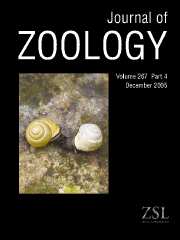Crossref Citations
This article has been cited by the following publications. This list is generated based on data provided by
Crossref.
Kerr, Gregory D.
Bull, C. Michael
and
Mackay, Duncan
2004.
Human Disturbance and Stride Frequency in the Sleepy Lizard (Tiliqua rugosa): Implications for Behavioral Studies.
Journal of Herpetology,
Vol. 38,
Issue. 4,
p.
519.
Kerr, Gregory D.
and
Bull, C. Michael
2006.
Exclusive core areas in overlapping ranges of the sleepy lizard, Tiliqua rugosa.
Behavioral Ecology,
Vol. 17,
Issue. 3,
p.
380.
Bull, C. Michael
and
Burzacott, Dale A.
2006.
The influence of parasites on the retention of long-term partnerships in the Australian sleepy lizard, Tiliqua rugosa.
Oecologia,
Vol. 146,
Issue. 4,
p.
675.
Calsbeek, Ryan
and
Sinervo, Barry
2008.
Alternative Reproductive Tactics.
p.
332.
Auburn, Zonnetje M.
Bull, C. Michael
and
Kerr, Gregory D.
2009.
The visual perceptual range of a lizard, Tiliqua rugosa.
Journal of Ethology,
Vol. 27,
Issue. 1,
p.
75.
Leu, Stephan T.
Bashford, Jim
Kappeler, Peter M.
and
Bull, C. Michael
2010.
Association networks reveal social organization in the sleepy lizard.
Animal Behaviour,
Vol. 79,
Issue. 1,
p.
217.
Ancona, Sergio
Drummond, Hugh
and
Zaldívar-Rae, Jaime
2010.
Male whiptail lizards adjust energetically costly mate guarding to male–male competition and female reproductive value.
Animal Behaviour,
Vol. 79,
Issue. 1,
p.
75.
Leu, Stephan T.
Kappeler, Peter M.
and
Bull, C. Michael
2011.
Pair-living in the Absence of Obligate Biparental Care in a Lizard: Trading-off Sex and Food?.
Ethology,
Vol. 117,
Issue. 9,
p.
758.
Leu, Stephan T.
Jackson, Grant
Roddick, John F.
and
Bull, C. Michael
2016.
Lizard movement tracks: variation in path re-use behaviour is consistent with a scent-marking function.
PeerJ,
Vol. 4,
Issue. ,
p.
e1844.
Keren-Rotem, Tammy
Levy, Noga
Wolf, Lior
Bouskila, Amos
Geffen, Eli
and
Somers, Christopher M.
2016.
Alternative Mating Tactics in Male Chameleons (Chamaeleo chamaeleon) Are Evident in Both Long-Term Body Color and Short-Term Courtship Pattern.
PLOS ONE,
Vol. 11,
Issue. 7,
p.
e0159032.
Tsellarius, A. Yu.
Tsellarius, E. Yu.
and
Galoyan, E. A.
2016.
Social relationships between males and females in the rock lizard (Darevskia brauneri, Lacertidae): 1. Friendly monogyny in males and polyandry in females.
Biology Bulletin,
Vol. 43,
Issue. 9,
p.
1077.
Bull, C. Michael
Gardner, Michael G.
Sih, Andrew
Spiegel, Orr
Godfrey, Stephanie S.
and
Leu, Stephan T.
2017.
Vol. 49,
Issue. ,
p.
1.
Norval, Gerrut
and
Gardner, Michael G.
2020.
The natural history of the sleepy lizard, Tiliqua rugosa (Gray, 1825) – Insight from chance observations and long‐term research on a common Australian skink species.
Austral Ecology,
Vol. 45,
Issue. 4,
p.
410.
Bales, Karen L.
Ardekani, Cory S.
Baxter, Alexander
Karaskiewicz, Chloe L.
Kuske, Jace X.
Lau, Allison R.
Savidge, Logan E.
Sayler, Kristina R.
and
Witczak, Lynea R.
2021.
What is a pair bond?.
Hormones and Behavior,
Vol. 136,
Issue. ,
p.
105062.
Sánchez-Hernández, Paula
Suárez-Rancel, M. Mercedes
and
Molina-Borja, Miguel
2021.
Intersexual behaviour and effect of male and female intruders in the Tenerife skink (Chalcides viridanus). Is there any mate guarding?.
Behaviour,
Vol. 158,
Issue. 10,
p.
901.
Mohanty, Nitya P.
Wagener, Carla
Herrel, Anthony
and
Thaker, Maria
2022.
The ecology of sleep in non‐avian reptiles.
Biological Reviews,
Vol. 97,
Issue. 2,
p.
505.




